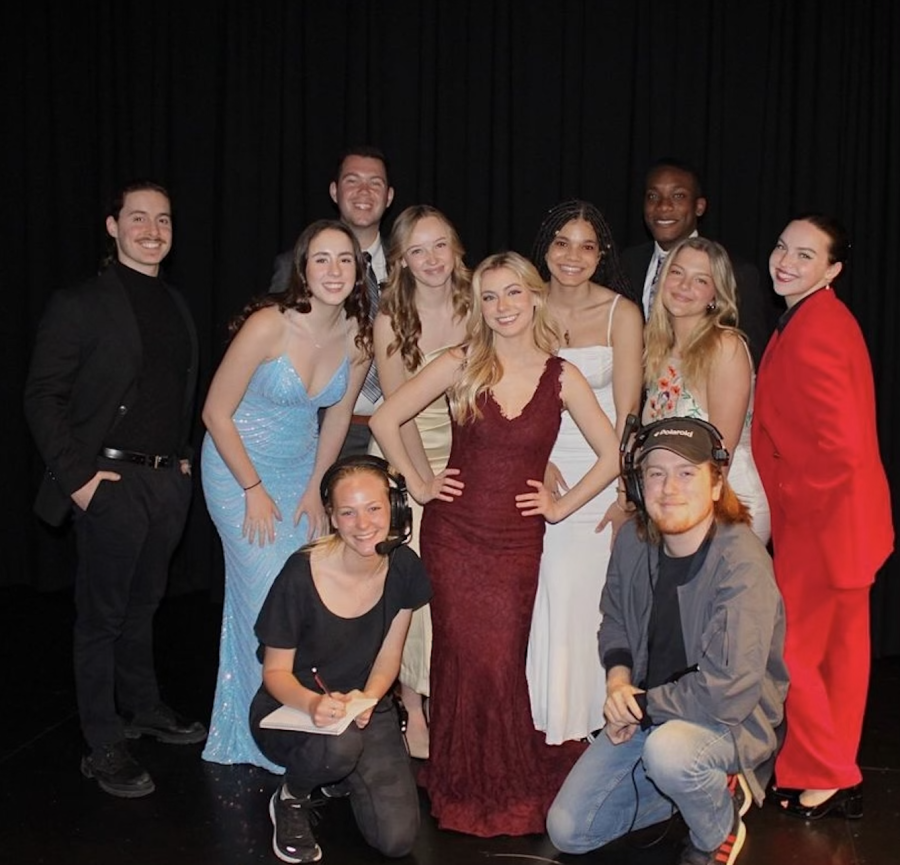Cammie Norman Presents “Will You Accept This Rose”
April 26, 2023
Ghris Marrison arrives on stage. A cue card is held up, reading “CLAP.” The audience does as it is told. This may feel like a live taping of The Bachelor, but this is not Los Angeles. This is the opening scene to Cammie Norman’s feminist satire “Will You Accept This Rose?”
On Wednesday, April 19th and Thursday, April 20th, Norman, a senior in Villanova’s Communication Department, presented her senior thesis performance, which allowed her to explore whether watching reality TV makes one a “bad feminist.”
The inspiration for Norman’s play stemmed from a character she created in her Theories of Performance Studies course.
“We were tasked with compiling a comedic monologue and delivering a two-minute bit of playing a certain character,” Norman said. “I chose this Bachelor piece, and I embodied this really exaggerated satirical character of this woman that goes on The Bachelor. I didn’t really think much of it. I’m a really big Bachelor fan, so it was natural to do that piece.”
After receiving positive feedback on her character, Brittany, Norman began to question why people resonated with her so deeply. In “Will You Accept This Rose?” Norman rethinks and deepens the character of Brittany, alongside a variety of other contestants, producers and a host of a show based on The Bachelor.
During her Qualitative Research course in the fall of 2022, Norman began compiling research to help guide her through her senior thesis performance and understand how to ethically perform gendered bodies. The actual script writing process began in the winter. Knowing that she wanted to create a feminist satire, Norman worked to highlight female voices throughout the show.
“The whole root of the show is that it’s a feminist satire and, while the content of the show ought to be feminist, I also wanted the methods of creating the show to be feminist,” Norman said. “That included going to my actors, specifically my female actresses and hearing their opinions.”
The story went from simply being Norman’s to being a story that was crafted by her accompanying actors. One of Norman’s priorities was highlighting the actors’ voices.
“This isn’t my story anymore,” Norman said. “This is our story. This is everything that we are creating together.”
With a last-minute change to the final line, Norman’s show came together and premiered in the Communication Department Theatre.
“Will You Accept This Rose,” was an interactive experience for the audience. Those in the audience of Norman’s performance played the role of the live audience for the fictional television show based on the play’s name. In under two hours, “Will You Accept This Rose?” details an entire season of the reality television show, complete with an engagement at the end. The audience explored both the on-screen and off-screen dynamics of reality TV. The show alternated between the filming of the fake reality show and showing conversations behind the curtain that never air.
Ghris Marrison, played by Derek Lattmann, introduces the five women vying for the heart of bachelor Nick Daly, played by Kristian Williamson. The women include Brittany, an actor posing as the ditz, played by Norman; Brianna, the intelligent frontrunner, played by Aaliyah Abdelhadi; Vanessa, the producer-constructed villain, played by Violet Bennett; country girl Hannah B. played by Madigan Reens and Bekah, the single mother and sob story, played by Bianca Brucker. Each contestant was brought on the show to fit a specific, gendered archetype.
Kylie Horan, who plays Vivian King, and Monroe Byer, who plays Trent Fleiss, are the producers of the fake television show “Will You Accept This Rose?” They constantly feud with each other and work as the masterminds behind which woman is eliminated and who becomes engaged. With their show in jeopardy of being canceled, they are determined to make this season perfect.
Throughout the show, the audience watched as the women fought, sometimes, literally, for Nick. One by one, women are eliminated, almost exclusively by the producers’ doings. Throughout the play, the audience clapped, booed and cheered on the women alongside their journeys to find love.
At the forefront of the show is Vanessa. Despite being shown as the villain, Vanessa is an MIT graduate with a Nobel Prize. The audience watched as the producers worked to dumb her down, manipulate her conversations with Nick and ultimately ruin her chances of finding love and getting engaged.
Nick and Brianna become engaged by the end of the season, leaving Vanessa heartbroken. Understanding the manipulation she has gone through, Vanessa confronts Vivian, critiquing her on her exploitation of the women and asking why she values pageants over science fairs. Vivian urges Vanessa to question why little girls love love and why the show is successful. In the end, they conclude that “nobody can beat the game.”
By the end of the play, the women get together for a fictional reunion episode, where they call out the influence the producers have and the stereotypes they were made to fit. The women prove that they can be multifaceted. The show, despite receiving high ratings, is canceled, but Vivian comes to terms with the fate of the show and even goes out for a drink with co-producer Trent.
Norman’s play urges those to rethink their notions of reality television. She portrays the blatant manipulation, scripting and stereotyping that occurs on shows such as The Bachelor. With Vivian, however, Norman adds a second voice to the narrative. This voice urges the audience to enjoy reality television for what it is, but to watch with a critical eye.
“We can take a look at reality television shows like The Bachelor and understand it through a critical lens,” Norman said. “I think something that is super fun about the show is that I don’t hate The Bachelor and I don’t fully love The Bachelor. I’m a feminist who watches The Bachelor, and I can recognize the anti-feminist aspects of it. It’s about having the audience look within themselves and think the next time they consume this media.”
In addition to watching reality television with a critical eye, through her performance, Norman wanted to portray the fact that popular culture is something that shapes the world. Media has an effect on how people understand what goes on around them.
“Popular culture does mean something,” Norman said. “It’s meaning-making and world-building. When you toss aside reality television, which is something that is very celebrated specifically within womanhood, that is tossing aside these meaning structures of the way that we perceive gender, the way that we perceive heteronormativity and heterosexual relationships and, honestly, how we manufacture this ‘ideal’ woman.”
As the curtain closed on “the most dramatic season of Will You Accept This Rose?” audience members shared laughs and learned the true reality of reality television.













